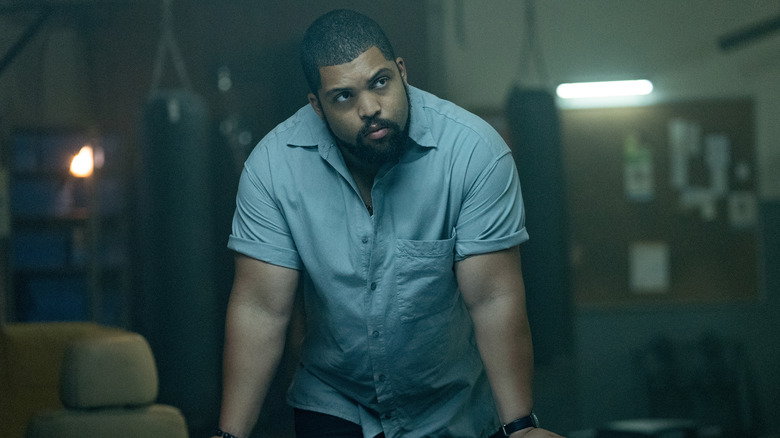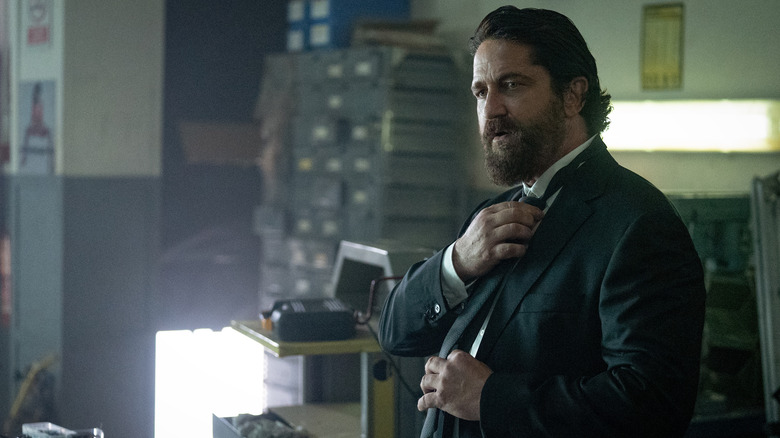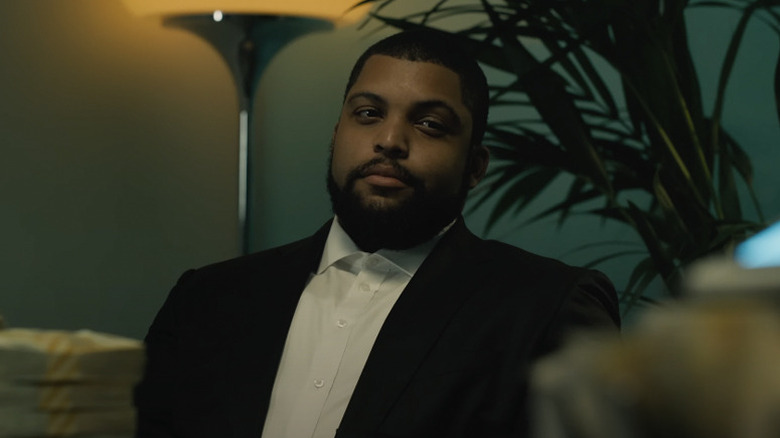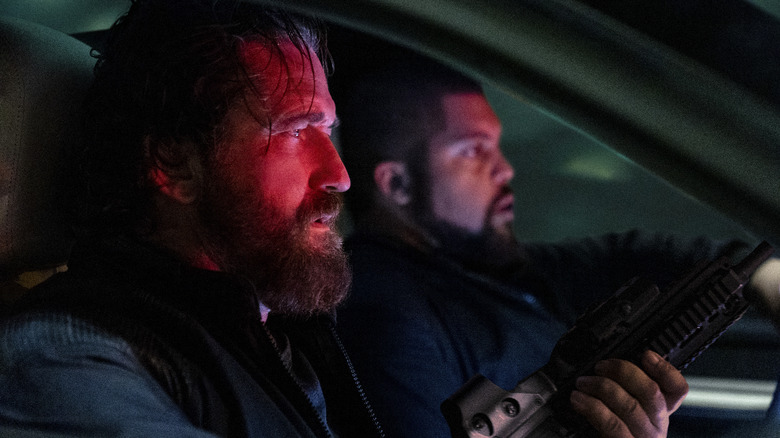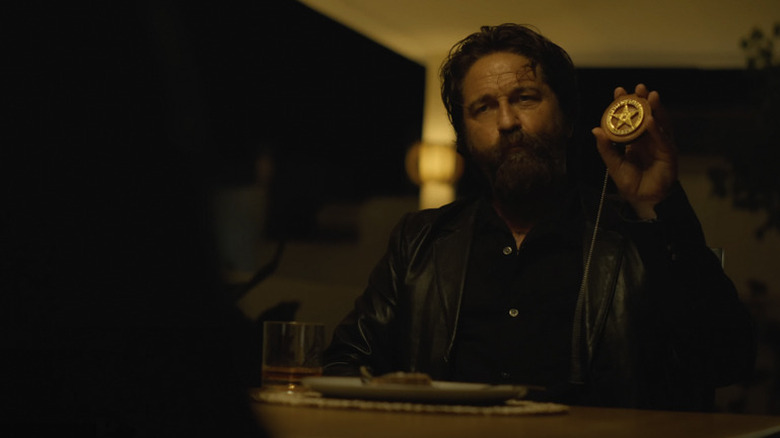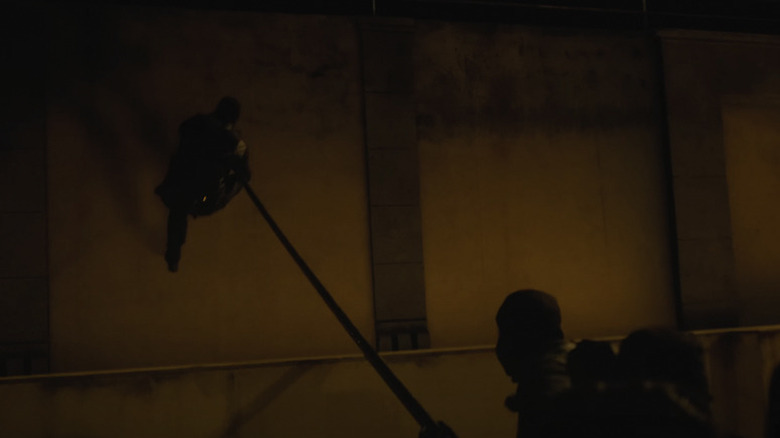Den Of Thieves 2: Pantera Writer/Director Says Its Heists Are All Based On Real-World Robberies [Exclusive Interview]
I caught up with 2018's cops-and-robbers action movie "Den of Thieves" on a plane years after it came out, and had a great time with it. The film is trashy, sweaty, pulpy fun, full of macho swaggering and characters who couldn't possibly care less about morality. Along with things like "Plane" and the "Has Fallen" franchise, "Den of Thieves" was one of the projects that helped crown Gerard Butler the king of trash cinema.
Now the king is back in the amazingly named "Den of Thieves 2: Pantera," a sequel that picks up basically right after the first movie ends and shifts the action from the dirty back streets of Los Angeles to Europe. That title has nothing to do with the heavy metal band — although it retains a little of that grungy, stringy-haired, wild-eyed energy that I think the band might approve of — and instead refers to a real-life international jewel thief network known as the Panther mafia, or the Pink Panthers, that operates out of Eastern Europe. "Pantera" is the Spanish word for panther, and as you'll read in my conversation with writer/director Christian Gudegast, authenticity was very important to him when bringing this story to life.
If the first movie was a hangover come to life, this one is maybe more akin to chasing a wild night with a six pack of Red Bull. O'Shea Jackson Jr.'s character, Donnie, the secret mastermind behind the heist of the Federal Reserve in the first movie, is about to rob the World Diamond Center in France, and Gerard Butler's Big Nick tracks him down — but not to arrest him. Nick's life is in such shambles back home that he flips and wants in on the heist himself. Personally, I still prefer the original movie because I think griminess works better with these characters than the comparatively slicker aesthetic here, and a lot of the dialogue in this sequel caused me to roll my eyes instead of pump my fist. But credit where it's due, I thought the climactic heist — the whole reason to even care about these movies in the first place — is fantastic. By the end, I was amped about the possibility of seeing more stories in this world, and Gudegast seems eager to return to it.
I caught up with the director back in early December to talk about expanding the scope of this franchise, altering the tone to produce something a little more fun than the first movie, his plans for a director's cut, and much more.
Note: This interview has been lightly edited for clarity and brevity.
Den of Thieves was almost a TV series
How did the sequel come about? Did you go to the studio and say, "I have another story to tell here," or did they come to you first?
Well, it was always planned out from the beginning. When I did my research for "Den 1" back in the day, I just came across so many different heists and I got to know the cops that were investigating them, and I just had so much material that we knew that we were going to be building a franchise. There was a minute way back in the day where it was going to become a TV series. So I mapped out longer for the arcs of Gerry, who plays Nick, and then O'Shea, who plays Donnie, their arcs and other heists around the world. So it was kind of planned out from the outset.
That's interesting. I had not heard that about the TV component.
It was a brief moment during development that was possibly going to happen.
Were you thinking about it in terms of multiple seasons or at that point, was it just one season?
No, it was written as a feature, and there was just a moment where, at that time they were taking feature scripts and turning them into television series. That happened with another project I was working on. In other words, I had so much material that it would've been easy to do, but then we ended up making the movie and here we are. But yes, it was always kind of planned out from the beginning.
I was going to ask if you had been sitting on this elaborate diamond heist idea for years, or if you basically wrote yourself into a corner with the ending of the first one and you took a break and then figured it out once you came back for the second one. But it sounds like you've had this one cooking for a while.
Yeah. Yes. The majority of the research for this I did after we did "1," but knowing that I was going to go into that world knowing a little bit about where we're going to go, but then the details I got into later after "Den 1" and when we got into the research for "Den 2."
Excellent. So was there something that you learned making the first movie that you were then able to put into practice on this one that made things easier for you or the cast or the crew?
I mean, look, every time out you become better at what you do, right? It's all about reps, right? So there's that. But what was easier about it is that I'd already worked with Gerry and O'Shea, and we all developed a real bond and camaraderie. And then re-teaming with them was awesome. It was great. And this time, it's more about the two of them, their characters — it's like a buddy movie. So that relationship was crucial, but there was an ease to it because we're all familiar with each other and we all worked together to success. So it was almost like a reunion.
Working with those two guys, did they have a similar way of working, or do you have to approach each of them differently as a director to give them what they need?
No, they're different. Everyone's a little bit different. In "Den 1," Nick's crew of The Regulators, the cops, and then Merriman's crew and Donnie's crew, we kept them very separate and offset and all the cops will hang out together, the criminals will hang out together. So on set, we developed a real kind of rivalry that was actually kind of legitimate. It was classic and beautiful and great to watch because it was kind of real. And this time was completely different, because now we're taking Nick and Donnie, we're putting them into a foreign environment in Europe, and they are adversaries, but then they kind of fall in love with each other, so we put them next door to each other. [The actors] were neighbors when we were shot in Spain, and they would hang out all the time, bro out, and we did stuff together. So the chemistry between them is real. It's real brotherhood that they formed, and you'll see it on screen.
Den of Thieves 2 aims to be more fun than the original
That love story between the two of them, it's not explicit but it is there, and that feels different than the first movie. So what was that like, working the character dynamics in a different way this time around?
Well, there's a little more fun to it. It translates a little bit different, which was great. There's a little more humor to it. Unfortunately, there are a lot of scenes that didn't make it into the film that explore that, but that'll be in the director's cut. But we all enjoyed, it was fun. There was a looseness to it. It was just a different tone, a different vibe that we wanted to bring to this one. So we all enjoyed it. The dialogue, [there] was just a little more humor, a little more comedy, and it was a great energy.
I read an interview where Gerard Butler also said he thought this movie is a lot more fun than the original one. So is that something that you find on the day, or is that something that you write into the script, where you're actively making the choice before you head into production that you want it to be a different tone like that?
Yeah, it was in the script for sure. I mean, for sure. But then you refine it when you're on set and doing rehearsals and everything, you refine it. But no, it's definitely established in the script. My scripts are written very, very specifically, very detail-oriented. So that's all mapped out before, but then you find a little more magic, of course, when you put it on its feet.
Something I always like to ask directors, especially writer/directors, is what did the movie teach you as you were putting it together? Because there's this thing where, when you're working on something, it kind of develops a life of its own and it kind of tells you what it wants to be at a certain point. So was there anything unexpected or interesting during post that you found where you're like, "Huh, I wasn't really planning on doing it this way, but it turns out this movie needs this here," or something like that? You know what I mean?
Yeah. I mean, God, there's so many little things that speak to that. It's a certain scene you realize you don't need. There's often in a lot of the plot mechanics, there's a lot of shoe leather, how you get from point A to point B. One big thing was, in the script — and Gerry and I talked a lot about it — there's a lot of exploration of why Nick is going to Europe, why he switches sides. So it was about calibrating him emotionally before he left and went over there, where his life was and what's that trigger to send him off this journey to go find Donnie. So it was about exploring that part of his life and what's going on. And there was more of that, that we shot, more of it in the script, and we cut some, and there was even some stuff that didn't end up in the film where we felt at the script stage that we needed those scenes emotionally to establish where he was.
And when we cut the film together, we realized we didn't need them. That we could sort of accelerate it more quickly, that we got where he was just by meeting him. So that one scene in the bathroom was like, "Okay, I get it." There was a little bit more of that, and then we realized after the fact [that we] didn't need it.
Ronin was an inspiration for Den of Thieves 2
Note: The rest of this interview contains spoilers for "Den of Thieves 2: Pantera," so proceed accordingly.
I'd love to hear more about Big Nick's arc, specifically. There's a nice reveal that happens at the end with Nick turning these people into the police, but he's at such a low point that it feels believable that he could have actually legitimately flipped. So tell me about the change that you wanted the audience to experience with this character in this movie versus what we saw in the first one.
So that's, again, speaking to what we just talked about. It's like where is Nick in his life when he goes on this journey? Maybe he went over there with one intention: "I'm going to bring Donnie down. This motherf***er pisses me off. He got away with it." And then he gets there and he meets the local law enforcement guys, doesn't get along with them. They treat him like s***. And he's at a foreign place and then suddenly he sees somebody that he knows, even though it's Donnie, it's a familiar face. It's like if you're traveling somewhere in part of the world and you see somebody [and you're] like, "Oh my God, what's up man?" and there's an instant connection there, and he's experiencing all these emotions. It's like a roller coaster, this constant up and down. We wanted to play with that throughout the film to feel which way is he going to go? and to understand the journey, the emotional roller coaster, that he's on.
But at the end of the day, it's like, "Man, I'm a cop. I can't do this." But then at the same time, he is like, "This is pretty fun." And the technical advisor and consultant, my friend who worked with us on "Den 1," Jay, we talked to him a lot about Nick's character in "Den 2." And Jay was an undercover cop for years and years, and there's that push-pull, right? You get into a world, you're all gung ho and rah-rah, and "I'm going to bring these guys down," and then you get to know them and you actually kind of like them. And then by the time it's time to bring them down, you feel like s***. They almost become a surrogate family for him. Now he's destroying that. It's like, "My family life at home's screwed up. Now I have this new family and now I'm bringing them down too." And he feels terrible. It's like, "Who am I? What am I doing?" It's a little bit of an identity crisis.
There are so many great heist movies that tap into that. I'm thinking of "Point Break," and the "Fast and Furious" movies do this as well. So in terms of cinematic references, there are obviously a million heist movies out there. So did you watch any of those in preparation for this, either for aspects that you wanted to pay homage to or for things that you knew that you didn't want to do?
I saw 10 minutes of the first "Fast and Furious" and didn't see any of the other ones. None of them. It was really, "Ronin" was a big influence. "Gomorrah," "Suburra," and then a lot of the old French New Wave like Melville and "Le Cercle Rouge" and "Rififi" and "Borsalino" and all those great movies. I mean, I've seen most of the old school classics. A lot of the new stuff I haven't really seen that much of, to be honest. But it's really about, you do the research, you go into the world, and you do your own thing. You try to be unique and original to yourself. You're not really trying to ... I mean, obviously as artists, we all have influences, of course, but there wasn't anything really specific that we were [going for], homage-wise. More the energy and vibe of certain films. "Ronin" was a big one, again, an American character in Europe and sort of a blend between American and European cinema, right? But there was no specific homage, no.
Were you ever worried at any point, because it's been several years since the first movie, that another modern heist film would come along and have a very similar plot point or something like that. Do you ever worry about that as a filmmaker at all?
I mean, you always kind of do, you know what I mean? I've had things in the past as a writer where you write a script, a spec, and it's great, and then suddenly you realize there's a very, very similar one coming out. I had that once years ago, I worked on a project called "The Company," and then when we were just about to set it up and go make it, that movie "The Recruit" came out with Colin Farrell and Al Pacino. And honestly, it was essentially the same movie. So that killed our movie. They beat us to the punch by a few months. So yes, of course you kind of think about that, but you've got to just put your best foot forward, do your thing, and hope for the best, right?
Both Den of Thieves movies will be getting a director's cut
I want to go back to the director's cut idea. Was there a director's cut for the first movie? I may have missed it if there was.
It's coming out. It's coming out, yeah.
Oh, okay. Interesting.
Yeah, we just did the mix recently. So yeah, [we're] definitely going to re-release it.
Very cool. Okay. So what kind of approach do you have to holding things back for a director's cut? What is the reason that things didn't make it into your theatrical cut for the second film? Was it just strictly for time?
Time. Time. It's just time. Look, as a filmmaker, I could watch something for four hours, but the dictates of how many runs in a theater you have a day and all that. And if it's too long, you miss one of the showings a day and it's not good for the box office, et cetera. There are mandates for that, so you have to hit that time. It's really that. In both "Den 1" and "Den 2," there was more exploration of the various characters and sort of the more character stuff, less the A plot. And "Den 1" was a lot with 50 [Cent]'s character, a lot with Pablo [Schreiber]'s character that didn't make it in, and Gerry's character that didn't make the cut. Great stuff. And similarly with this, there's really a lot between the two of them, between Nick and Donnie, that didn't make it. It's all fun stuff.
Okay, so I wanted to talk to you about the locations. Especially the establishing shots, I'm assuming a lot of that was second unit stuff, but it just looks amazing. I was wondering how you went about finding the right places in the world to shoot this movie, because the scope is so much more expansive than just the L.A. setting of the first film.
Right. I mean, so scope-wise, I wanted to do that from the very beginning, right? So again, while researching, going to all the actual places, meeting actual people in Belgium, France, the Balkans, and when I do research, also, I'm a photographer, so I run around and I photograph everything and I build sort of a lookbook and rent a car and drive around and just find the spots. And then we ended up shooting in the majority of those places. Now, the main shoot was in Tenerife, and second unit we did everywhere else. But it was just about matching those actual places where the stuff actually went down very specifically. I would shoot the actual World Diamond Center and go shoot the exfil roads they drove on, and we would just basically match them. Again, we were able to shoot some of the actual locations a little bit, but it's just matching what's in the lookbook that I build during the process of researching the movie.
The climactic heist in this film is so well staged, and it seems just like a massive undertaking to be able to execute something like that, which is so sustained over a long period of the movie, to such a high level. So tell me about some of the work that went into pulling that off.
Well, first it was, again, the research with my technical advisors getting the technical detail right. And that's all fascinating, how they actually did it. Then it was really, we wanted to explore the physical — there's a great physicality to the heist, like isometric strength, when they're doing the rappelling and getting in and out of that building, it's very exhausting. They're wearing those neoprene suits, they're holding the heat and everything, but they have to remain quiet, of course. So it's all about that tension, breathing, keeping a rhythm to your breathing so it doesn't get too loud and steady, and about slow precise movements. There's a precision to it that we wanted to capture, but of course, through all that, there's great tension and there's a great sort of quiet. We wanted to play with the quietude of it. And how moving through that environment is very, very tense, very difficult, very exhausting. That's what we were really capturing.
Accuracy is crucial to the Den of Thieves franchise
When you talk about basing this on things that actually happened, do you as a storyteller change any of the reality a little bit, just to not give people a blueprint of how to actually do this kind of thing? Or do you keep it as close as possible to the real event?
Well, I mean, I try to keep as close as possible. There's certain realities, when they can't disclose certain things. The people you work with will ask, "Hey, can you not do this or do that or say this or that?" And then you have to, of course, oblige out of respect, obviously. It's a movie, it's not real world. But at the same time, we get it as close as you possibly can without going too far. But it is a very, very close representation.
So that hook device that they use to switch between buildings, is that a real thing?
Yeah, it's called a Vietnamese pole cross. And it was developed by SWAT teams to breach the first few floors of a building if they can't get up otherwise, onto a balcony or whatever. So that is absolutely real. Yeah.
Okay, so I think I'm running out of time with you, but one of the last questions that I wanted to ask is, what's the thing that you're the most proud of about this movie, looking back on the whole experience of making it?
The performances of Gerry and O'Shea, Nick and Donnie. That, and the look. Those two things. I really drill down on the look and the vibe and the energy of the film, and the performance of the two leads. They're fantastic.
The movie ends with this really nice setup for a third film. Do you have any plans to come back and write and direct another "Den of Thieves" movie?
Oh, yeah. Oh, yeah. Yep. Yes, sir. Yes, absolutely. Yeah.
So are you sort of in it for the long haul on this thing? How many movies do you envision there being, if all goes according to plan?
I mean, right now, for sure, four.
Oh, cool.
But we'll see. We'll see how it goes.
"Den of Thieves 2: Pantera" is in theaters now.
